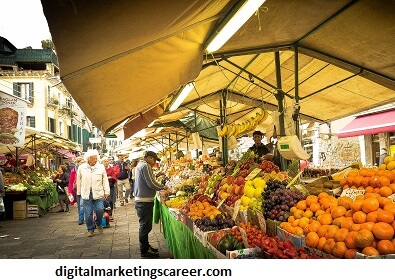Farm-to-market entertainment: Bringing agriculture together with leisure:
Market:
Introduction:
Farm-to-market entertainment has become a modern concept by which urbanites can connect directly with rural cultures, farmers’ practices, and the area’s natural beauty. As awareness of the origins of purchased food and production methods of food increases with modern customers. Many farms have diversified into destinations to offer specific experiences. Farm-to-market entertainment combines agriculture with leisure experiences that, through hands-on immersion and fun, educate, entertain, and reconnect people to the natural world.

This could be everything from food festivals and farm tours to seasonal events, workshops, and farm-to-table dining experiences.
I will explore the farm-to-market entertainment concept, tracing it from the heart of the content to the positive effects. This can bring farmers, consumers, and also to a larger society. I will also present a few trends of increase in this kind of activity about food locality, increases in issues concerning sustainability, and growing requests for experiences’ authenticity. Last but certainly not least, future directions are in focus with all the prospects that such activities hold to change the world in both agriculture and entertainment.
What is Farm-to-Market Entertainment?
Farm-to-market entertainment is a byproduct of the farm-to-table and agritourism movements. Whereas the farm-to-table movement emphasizes taking direct ingredients from local farms to serve fresh. Sustainable meals and farm-to-market entertainment incorporate those values into engaging, often seasonal activities. These activities may include things such as corn mazes, harvest festivals, hayrides, and farm-to-table dinners. Wine tastings, cooking workshops, and farm stays. These activities are aimed at entertaining visitors while teaching about farming practices, seasonal eating, and the importance of supporting local agriculture.
Evolution of Agritourism:
Market:
This entertainment follows the large trend in agritourism: farms diversify revenues by opening up to recreational visitors. Once considered more as an agricultural process awareness-raising, agritourism has evolved to become a variety of experiences merging education, leisure, and nature. Contemporary farm-to-market entertainment has reconceptualized it, emphasizing interaction, engagement, and immersion through activities.
Key Elements of Farm-to-Market Entertainment:
Market:
Farm-to-market entertainment is very broad, as it incorporates a wide range of activities that are all set to attract visitors with different tastes and interests. Here are a few of the most popular components:
1. Seasonal Festivals and Events:
Farm-to-market fun takes the form of themed seasons and festivals. Since all events are planned in concordance with the local farm calendar, visitors are to encounter farm life at high times of the year during seasons. In the autumn months, many farms focus on pumpkin patches, corn mazes, and other harvest festivals that commemorate and rejoice in the bounty available that season. During the spring and summer months, themes can include strawberry picking festivals and flower festivals and an opportunity to visit fresh product markets.
Farm-based festivals offer the most unique farm life experience, usually supplemented with live performances, petting zoos, and even cooking demonstrations. Seasonal events are more than an attraction for domestic families, but also for people from urban areas seeking time to revive themselves.
2. Agritourism and Homestays:
Dining with farm-to-table is actually among the attractions within this entertaining farm-to-market event. Dinners are frequently available at the farms with which the guest is sitting; meals are prepared out of locally sourced ingredients that make these meals a taste. Many multi-course meals showcase what the season offers from this farm, all direct-harvested farm items.
An example might be farm-to-table dinners that include farm-fresh appetizers and salads as openers; main courses that feature meats or vegetables grown on the farm; and a dessert course highlighting seasonal fruits. Often part of the dinner is an actual tour of the farm, during which guests are educated on the sources and preparation of each ingredient. This makes the consumer have fun while having access to sustainable farming and amazing efforts behind premium organic ingredient productions in meals where the food served becomes directly related to fields that farmed that meal.
3. U-Pick and Harvest Experience:
More and more customers are looking for experiences of direct involvement with sources of food, and a major part of this new is u-picking experiences. Many farms encourage consumers to come in during various seasons to pick strawberries during the spring, apples in the fall, or fresh vegetables during the growing season. U-pick The experience generates a sense of satisfaction when visitors are involved firsthand in the harvesting process.
It also reduces labor input for farmers who are harvesting. It even makes consumers see firsthand what is involved in picking fruits and vegetables, making someone get a deeper connection to the food that he or she eats.
4. Cooking Classes and Workshops:
Farm-to-market entertainment sites offer cooking classes and workshops to teach their visitors how to prepare seasonal dishes using fresh ingredients, from baking and canning to more advanced culinary techniques like farm-to-table meal preparation and pairing wines with locally sourced foods.

Cooking classes are often outside or held in rustic farm kitchens; guests get the opportunity to experience cooking under ainxed a rural environment. After learning some of the culinary skills and how to preserve foods, guests can take parts of this farm life experience back with them and understand why their food is made with a more sustainable perspective.
5. Farm Stays and Immersive Experiences:
Farm stays are overnight or longer stays on a working farm, providing a fully immersive farm-to-market experience. Guests may participate in daily farm activities, such as feeding animals, planting crops, or even helping with milking. Farm stays are especially popular among families and city-dwellers seeking a break from urban life.
These experiences provide guests with a connection to the rhythms of rural life, experience hard work involved in farming, and cultivate greater respect for sustainable agriculture. Farm stays offer a sense of reconnection with nature that comes with relaxation and education to many.
Market Demand and Consumer Trends Driving Farm-to-Market Entertainment:
Market:
1. Rise of Experiential Travel:
Rising interest in experiential travel is one of the most significant reasons fueling the growth of farm-to-market entertainment. Present-day tourists, especially millennials and Gen Z, focus much on experiences over possessions for unique, hands-on activity-based offerings. More than any other practice, farm-to-market entertainment combines novelty, education, and rest in ideal proportions, enthralling every experience-oriented tourist.
2. Increased Curiosity towards Sustainable Lifestyle:
As consumers are becoming more conscious of the impact of industrial agriculture on the environment, the demand for sustainable farming practices has increased multifold. An entertainment model like farm-to-market can be an excellent vehicle for educating visitors about the methods applied in sustainable farming and organic farming and the requirement to promote and support local farms. If farms share their operations with the people, they gain the trust of conscious consumers who invest in sustainable lifestyles.
3. Fresh food:
Locally sourced demand represents the third factor that spurs an increase in farm-to-market entertainment. Consumers do not only want fresh produce; they also want to be connected to the story. Such activities as U-pick experiences and farm-to-table dinners give customers an instantaneous connection to the farm while they appreciate the freshness of foods grown locally.
4. Digital Influence and Social Media Appeal:
Farm-to-market entertainment is visually appealing and, therefore suitable for social media, especially for Instagram and TikTok. People want to take pictures walking through flower fields or taking part in farm dinners. This is an organic way of advertising these destinations. Social media exposure also pushes others to visit, meaning that farms can reach an audience that they would not have reached otherwise through marketing.
5. Health and Wellness Trends:
Health and wellness are taking center stage in consumer lives, and farm-to-market entertainment fits perfectly into the trend. The activities involved in farm-to-market entertainment, such as picking fruits and vegetables or consuming fresh foods, attract consumers who seek health-oriented activities. It is a perfect experience to spend time outside in the natural environment, breathe in fresh air, and enjoy healthy food.
Advantages of Farm-to-Market Entertainment for Farmers and Communities:
Market:
Farm-to-market entertainment entails several benefits for farmers and the general communities around them.
1. Additional Revenues:
Farm-to-market entertainment diversifies income and reduces dependence on crop yields. Experiences and products other than farming provide the farmer with different ways of generating revenue as a means of stabilizing their income during low crop yields or when prices become too unstable. Seasonal events, U-pick programs, and farm-to-table dining experiences are examples through which farms can source their supplementary income.
2. Improved Livelihood Ends:
Farm-to-market entertainment can easily create a sense of community as people come together over shared interests in food, agriculture, and the environment. Many farms even plan events specifically for the local schools, clubs, or organizations to network and educate people about agriculture. Besides that, with local farms hosting events or workshops, they tend to partner with local restaurants or artisanal, fostering a collaborative environment that supports the whole local economy.
3. Education:
Entertainment between the farm-to-market allows educatinforor education on how farming is conducted, the production of food, and sustainability,n inability Most farms allow workshops and guided tours on sustainable agriculture, soil health, and organic, farming practices. All this teaches the community, that a healthy society is when people learn about responsible food production and eco-friendly selection.
4. Preservation of Agricultural Heritage:
Farm-to-market entertainment can retain agricultural heritage by educating the public through farm tours and tastings on traditional farming methods, recipes, and even heirloom varieties of plants. Thus, farms ensure that agricultural heritage is preserved and relevant to this day.
Challenges and Considerations in Farm-to-Market Entertainment:
Despite the many benefits of farm-to-market entertainment, there are challenges. The first is the investment in infrastructure, staffing, and marketing. Farms also have to balance public access and maintaining a productive agricultural environment. Safety and liability are also concerns, as farms must ensure safe conditions for visitors, especially children and those unfamiliar.

